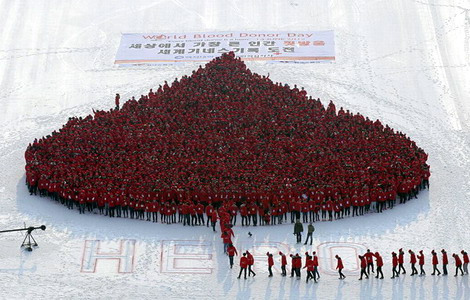Manufacturing continues to expand
Updated: 2012-03-02 09:01
By Chen Jia and Wu Yiyao (China Daily)
|
|||||||||||
Index hits five-month peak, easing concerns over economic slowdown
BEIJING / SHANGHAI - Manufacturing bounced back to a five-month peak in February, supported by stronger exports, easing concerns about a possible contraction.
The purchasing managers' index, an indicator of manufacturing activity, hit 51 last month, 0.5 points higher than January, the National Bureau of Statistics and the China Federation of Logistics and Purchasing revealed on Thursday.
It has stayed above the 50-point level for three consecutive months after it dropped to a 32-month low of 49 in November. A reading higher than 50 means expansion, while below 50 shows contraction.
"The continually increasing PMI proves the nation is undergoing an economic rebound, propped up by industrial production," Zhang Liqun, a research fellow with the Development Research Center of the State Council, said.
In view of the current economic situation the forthcoming two sessions of the National People's Congress and the Chinese People's Political Consultative Conference are expected to further clarify the government's stance.
"The government may highlight the modest easing to support growth, while fiscal spending is likely to be tilted more to livelihood areas," said Wang Tao, chief economist with UBS China.
Liu Ligang, director of the economic research department of ANZ Greater China, attributed the rebound to China's easing monetary policies and improving external climate.
China announced last month that it would cut the reserve requirements for banks which Liu said would help direct more capital to the economy.
Economic growth declined to 8.9 percent in the final quarter last year after Beijing hiked interest rates and tightened other controls to tame inflation.
The government reversed course in December and promised more bank lending to help companies cope with the slump in global demand but changes have been gradual.
In February the sub-index of industrial output climbed to 53.8 from 53.6 in January, its highest in six months.
Unlike the January growth, which was mainly driven up by consumer spending during the Lunar New Year holidays, the rise in February was fueled by expansion of electrical and mechanical equipment manufacturing, a report from the logistics federation said.
There was also good news on the export front. Orders increased to 51.1, 4.2 points higher than the January reading, the first time it was above 50 since August 2011.
It may be a sign of a trend initiated by rising US manufacturing and the improved situation in the indebted eurozone, the federation said.
Zhou Dewen, chairman of the Wenzhou Small and Medium-Sized Enterprises Development Association, said manufacturers in Wenzhou are busier, so far, in 2012 than they expected to be.
Many export-oriented businesses in Wenzhou are developing new markets outside Europe, North America and Japan and are seeking new distribution channels in South America, Africa and the Pacific Rim, Zhou said.
The purchasing prices index, which shows the raw material costs of industrial production, jumped to 54 in February, the highest since October last year.
Zhang warned that the surging prices, especially for oil-related commodities and chemicals, might indicate inflationary pressure and threaten future economic growth.
The consumer price index, a main gauge of inflation, increased to 4.5 percent in January from 4.1 percent in December, forcing authorities to remain vigilant over inflation while maintaining growth.
According to the official statement, small companies were able to expand at a faster pace according to a sub-index reading of 55.2, up by 3.2 points from a month earlier.
Small and medium-sized businesses have benefited from government support. In addition, the central bank's move to reduce bank reserves on Feb 24 increased market liquidity.
However, an HSBC index portrayed a different view of manufacturing.
The HSBC PMI reading of 49.6 indicated a contraction although recording a better performance from the 48.8 in January.
"Deteriorating external demand is adding more downside risks to growth in the absence of a strong comeback in domestic demand," said Qu Hongbin, HSBC chief economist in China.
Zhang Zhiwei, chief economist in China with Nomura Holdings, also had a dim view. He expected that PMI in March will drop, because of cooling export and property sectors.
Zhang said that the People's Bank of China, the central bank, may cut interest rates by 25 basic points in March and again cut bank reserve requirements by 50 basic points in April, to prevent a further slowdown.
Xinhua contributed to this story.








